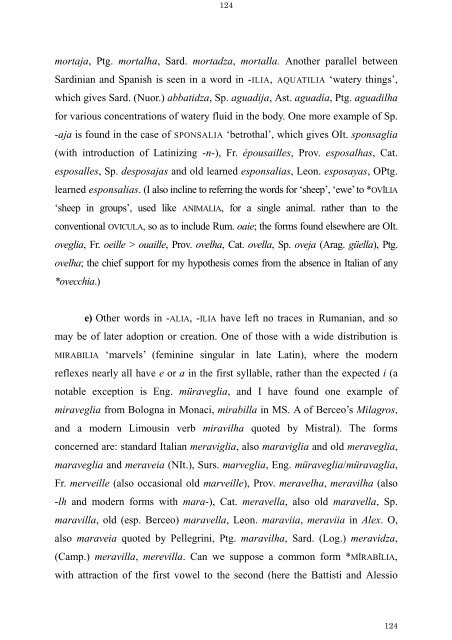The Latin Neuter Plurals in Romance - Page ON
The Latin Neuter Plurals in Romance - Page ON
The Latin Neuter Plurals in Romance - Page ON
Create successful ePaper yourself
Turn your PDF publications into a flip-book with our unique Google optimized e-Paper software.
124<br />
mortaja, Ptg. mortalha, Sard. mortadza, mortalla. Another parallel between<br />
Sard<strong>in</strong>ian and Spanish is seen <strong>in</strong> a word <strong>in</strong> -ILIA, AQUATILIA ‘watery th<strong>in</strong>gs’,<br />
which gives Sard. (Nuor.) abbatidza, Sp. aguadija, Ast. aguadía, Ptg. aguadilha<br />
for various concentrations of watery fluid <strong>in</strong> the body. One more example of Sp.<br />
-aja is found <strong>in</strong> the case of SP<strong>ON</strong>SALIA ‘betrothal’, which gives OIt. sponsaglia<br />
(with <strong>in</strong>troduction of <strong>Lat<strong>in</strong></strong>iz<strong>in</strong>g -n-), Fr. épousailles, Prov. esposalhas, Cat.<br />
esposalles, Sp. desposajas and old learned esponsalias, Leon. esposayas, OPtg.<br />
learned esponsalias. (I also <strong>in</strong>cl<strong>in</strong>e to referr<strong>in</strong>g the words for ‘sheep’, ‘ewe’ to *OVĬLIA<br />
‘sheep <strong>in</strong> groups’, used like ANIMALIA, for a s<strong>in</strong>gle animal. rather than to the<br />
conventional OVICULA, so as to <strong>in</strong>clude Rum. oaie; the forms found elsewhere are OIt.<br />
oveglia, Fr. oeille > ouaille, Prov. ovelha, Cat. ovella, Sp. oveja (Arag. güella), Ptg.<br />
ovelha; the chief support for my hypothesis comes from the absence <strong>in</strong> Italian of any<br />
*ovecchia.)<br />
e) Other words <strong>in</strong> -ALIA, -ILIA have left no traces <strong>in</strong> Rumanian, and so<br />
may be of later adoption or creation. One of those with a wide distribution is<br />
MIRABILIA ‘marvels’ (fem<strong>in</strong><strong>in</strong>e s<strong>in</strong>gular <strong>in</strong> late <strong>Lat<strong>in</strong></strong>), where the modern<br />
reflexes nearly all have e or a <strong>in</strong> the first syllable, rather than the expected i (a<br />
notable exception is Eng. müraveglia, and I have found one example of<br />
miraveglia from Bologna <strong>in</strong> Monaci, mirabilla <strong>in</strong> MS. A of Berceo’s Milagros,<br />
and a modern Limous<strong>in</strong> verb miravilha quoted by Mistral). <strong>The</strong> forms<br />
concerned are: standard Italian meraviglia, also maraviglia and old meraveglia,<br />
maraveglia and meraveia (NIt.), Surs. marveglia, Eng. müraveglia/müravaglia,<br />
Fr. merveille (also occasional old marveille), Prov. meravelha, meravilha (also<br />
-lh and modern forms with mara-), Cat. meravella, also old maravella, Sp.<br />
maravilla, old (esp. Berceo) maravella, Leon. maraviia, meraviia <strong>in</strong> Alex. O,<br />
also maraveia quoted by Pellegr<strong>in</strong>i, Ptg. maravilha, Sard. (Log.) meravidza,<br />
(Camp.) meravilla, merevilla. Can we suppose a common form *MĬRABĬLIA,<br />
with attraction of the first vowel to the second (here the Battisti and Alessio<br />
124









